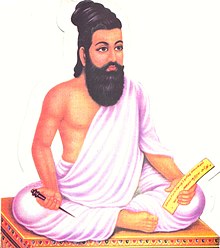**Biographical Information:**
– Limited authentic details about Thiruvalluvar’s life.
– Uncertainty surrounding his actual name, birthplace, and date.
– Speculations about his background largely inferred from his literary works.
– Traditional biographies contain inconsistent and unverifiable claims.
– Believed to have lived in Mylapore, possibly married to a woman named Vasuki.
**Religious Affiliation:**
– Debate over Thiruvalluvar’s religious beliefs, possibly Jainism or Hinduism.
– Influence of Jain moral code in his work, but also references to Hindu deities.
– Claims from various religious groups, including Christianity and Buddhism, about Thiruvalluvar.
– Interpretations aligning his teachings with Hindu concepts, while some scholars view him as non-denominational.
– Presence of Sanskrit loan words and influences in his work.
**Literary Works and Influence:**
– Primary work is the Tirukkural, containing 1330 couplets on various topics.
– Emphasis on moral, political, and economic aspects, reflecting realism and pragmatism.
– Translated into multiple languages, including Latin, expanding its reach.
– Influence on ethical, social, political, and spiritual spheres enduring over time.
– Interpretations of Tirukkural vary, with some aligning it with Hindu concepts and values.
**Reception and Memorials:**
– Valluvar revered as a great sage and his work considered a classic of Tamil culture.
– Temples and memorials dedicated to Valluvar in South India, including Mylapore and Tiruchuli.
– Valluvar Kottam in Chennai and a 133-foot tall statue in Kanyakumari symbolize his themes.
– Valluvar Day celebrated on January 15th in Tamil Nadu, with a history dating back to 1935.
– Influence on South Indian classical music and popular culture, with compositions of his couplets by Carnatic musicians.
**Historical Significance and Interpretations:**
– Valluvar’s historical context and significance remain uncertain due to lack of authentic information.
– Interpretations of Tirukkural vary, with views ranging from practical and pragmatic to aligned with specific religious beliefs.
– Scholarly consensus places the dating of Tirukkural and Valluvar around 500 CE.
– Influence of Sanskrit and Hindu concepts in his work, alongside debates about his religious affiliation.
– Various literary works attributed to Valluvar, with Tirukkural being the most renowned and influential.
Thiruvalluvar, commonly known as Valluvar, was an Indian poet and philosopher. He is best known as the author of the Tirukkuṟaḷ, a collection of couplets on ethics, political and economic matters, and love. The text is considered an exceptional and widely cherished work of Tamil literature.
Thiruvalluvar | |
|---|---|
 Artistic modern depiction of Thiruvalluvar | |
| Born | Uncertain |
| Other names |
|
| Notable work | Kural |
| Spouse | Vasuki |
| School | Indian philosophy |
| Notable students | Elelasingan |
| Language | Old Tamil |
Main interests | |
Notable ideas | Common ethics and morality |
Almost no authentic information is available about Valluvar, states Kamil Zvelebil – a scholar of Tamil literature. His life and likely background are variously inferred from his literary works by different biographers. There are unauthentic hagiographic and legendary accounts of Valluvar's life, and all major Indian religions, as well as Christian missionaries of the 19th century, have tried to claim him as secretly inspired (crypto-) or originally belonging to their tradition. Little is known with certainty about his family background, religious affiliation, or birthplace. He is believed to have lived at least in the town of Mylapore (a neighbourhood of the present-day Chennai), and his floruit is dated variously from fourth century BCE to early fifth century CE, based on the traditional accounts and the linguistic analyses of his writings. Kamil Zvelebil infers the Tirukkuṟaḷ and Valluvar are best dated to around 500 CE.
Valluvar has influenced a wide range of scholars down the ages since his time across the ethical, social, political, economical, religious, philosophical, and spiritual spheres. He has long been venerated as a great sage, and his literary works a classic of Tamil culture.
